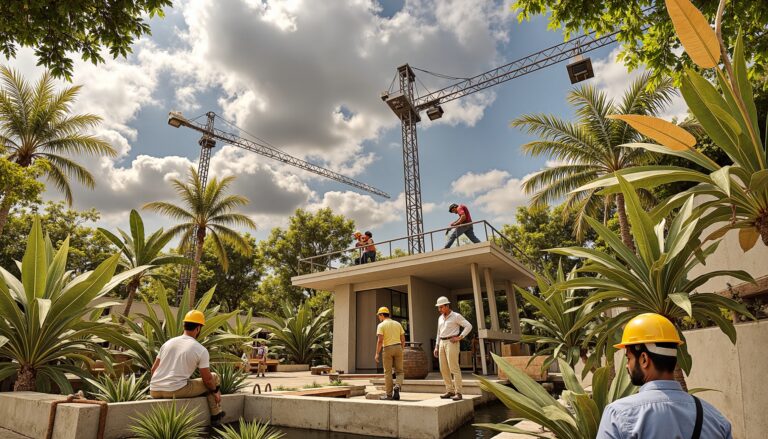As the world of real estate continues to evolve, staying ahead of the curve requires a deep understanding of real estate projections.
These forecasts not only inform buyers and investors about potential financial opportunities but also help them navigate the complexities of a rapidly changing market.
In this article, we’ll break down what real estate projections are, the key factors influencing these trends, and how technology is playing a pivotal role in shaping the future of real estate.
Additionally, we’ll discuss regional market projections to keep an eye on, investment strategies based on current trends, and how to prepare for the inevitable changes in the market.
Let’s unlock the future together!


Regional Market Projections: What to Watch For
As investors and homebuyers turn their attention to Costa Rica, understanding the regional market projections for real estate becomes crucial.
The country, known for its stunning landscapes and biodiversity, has seen a steady growth in its real estate sector over recent years.
Key projections for the real estate market indicate a continued increase in demand, particularly in coastal regions such as Guanacaste and the Central Pacific.
Factors contributing to this trend include an influx of expatriates, an expanding infrastructure, and a focus on eco-friendly developments.
Furthermore, the rising trend of remote work has reshaped buyer preferences, leading to a surge in interest for properties that combine luxury with nature.
Investors should keep an eye on these trends to capitalize on emerging opportunities in Costa Rica’s vibrant real estate market.
The Role of Technology in Shaping Real Estate Futures
Technology has fundamentally transformed numerous industries, and real estate is no exception.
The role of technology in shaping real estate futures is becoming increasingly crucial as we move deeper into the digital age.
Real estate projections are now more data-driven than ever, leveraging advanced analytical tools and software that provide insights into market trends, pricing dynamics, and buyer behavior.
Virtual and augmented reality allow potential buyers to tour properties from the comfort of their own homes, expanding access and increasing engagement.
Additionally, artificial intelligence is being utilized to predict market shifts and investment opportunities, enabling buyers and sellers to make informed decisions.
Blockchain technology is also paving the way for increased transparency and security within transactions.
As we look ahead, the integration of these technologies will undoubtedly influence real estate projections, offering more accurate forecasts and a better understanding of market fluctuations.

Investment Strategies Based on Projections
When it comes to navigating the ever-evolving world of Costa Rica real estate, understanding real estate projections can significantly improve your investment strategies.
As experts forecast trends based on economic indicators and market demands, potential investors can make informed decisions that align with anticipated changes in property values and market dynamics.
For instance, by analyzing current migration trends and tourism growth, investors can identify emerging hot spots for development before they experience rapid price increases.
Moreover, looking at historical data allows for a better comprehension of seasonality effects on property prices, enabling investors to time their purchases wisely to maximize returns.
As you delve into the Costa Rica real estate market, integrating real estate projections into your investment strategy is not just beneficial, but essential for long-term success.
Preparing for Changes: How to Adapt in a Shifting Market
As we venture further into an era of economic uncertainty, understanding real estate projections becomes crucial for both buyers and sellers in the market.
In Costa Rica, the real estate landscape is evolving, influenced by trends such as remote working and digital nomadism.
Those looking to invest should prepare for changes by monitoring market trends and analyzing past sales data to anticipate future opportunities.
Additionally, engaging with local real estate experts can provide invaluable insights into pricing fluctuations and neighborhood developments.
Adapting your investment strategy in response to real estate projections not only helps safeguard your investment but also positions you to seize lucrative opportunities as the market rebounds.
Frequently Asked Questions
What are real estate projections?
Real estate projections are forecasts that evaluate future trends in the real estate market, taking into account various factors such as economic indicators, demographic changes, and market demand.
What factors influence real estate trends and projections?
Key factors influencing real estate trends include economic conditions, interest rates, regional demand and supply dynamics, population growth, and technological advancements.
How can I identify regional market projections?
To identify regional market projections, consider local economic reports, real estate analytics, market surveys, and credible sources like real estate associations that provide data on specific areas.
What role does technology play in real estate projections?
Technology plays a crucial role in real estate projections by providing data analytics, predictive modeling, and tools that enhance market analysis, helping investors and professionals make informed decisions.
What investment strategies should I consider based on real estate projections?
Investment strategies may include diversifying your portfolio, focusing on emerging markets, leveraging data for timing purchases or sales, and staying informed on market shifts to adapt your approach.





